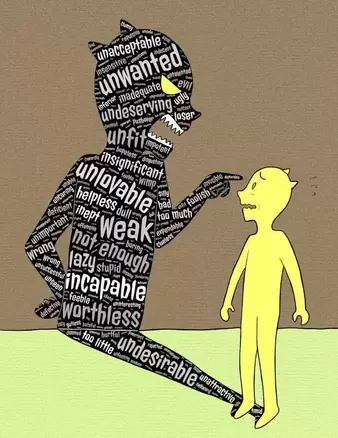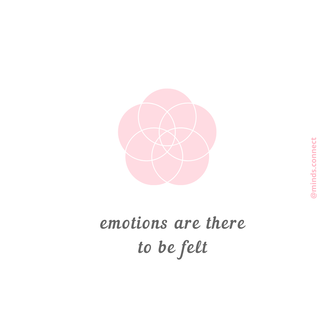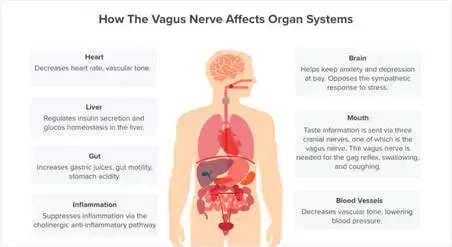|
👉Myth 1
❇️"vulnerability is weakness"❇️ 🔹vulnerability is neither good nor bad 🔹it is not a "dark" emotion 🔹it is not always comfortable 🔹it is the core of all emotions & feelings; "to feel is to be vulnerable" 🔹it is the birthplace of love, belonging, joy, courage, empathy & creativity 🔹is the path for clarity & purpose 🔆vulnerability is uncertainty, risk & emotional exposure🔆 🧘🏽♀️We are humans beings with limits, fears and wounds. You can only accept yourself fully and truly when you are able to see that side of yours that suffer and has difficulties 👉Myth #2 🔆"I don't do vulnerability"🔆 EXPERIENCING VULNERABILITY IS NOT A CHOICE. OUR RESPONSE TO IT IS. BEING ALIVE MEANS BEING VULNERABLE. 🌸Examples of vulnerability: ▪️starting you own business ▪️saying "I love you" ▪️facing your fears ▪️being "all in" ▪️letting go of control ▪️saying no - not taking it anymore ▪️panic, anxiety, fear & hysteria followed by freedom, pride & amazement. ▪️showing up and letting yourself be seen 🌻letting ourselves sink into the ephemeral joyful moments of life is vulnerability 🌻
0 Comments
It may sabotage our successes or our relationships, preventing us from living the lives we want to live and becoming the people we desire to be.
❇️3 inner critics that all of us have to face❇️ 👉SHAME 🔹universal human emotion, typically associated with a negative evaluation of the self; "I am not enough" 👉SCARCITY 🔹never feeling safe, certain & sure enough; "too good to be true", "it is never enough", "don't get so happy, something bad is going to happen" 👉COMPARISON 🔹measuring the self against others. Comparison kills creativity and joy; "X is better than me" 🔆We all experience internal voices that could be nurturing ("you can do this") or invalidating ("you are a failure") Both coexist and play an important role on our daily functioning. 👉These voices influence how much we dare to take risks, to believe in ourselves, to engage in relationships, to pursue certain careers, etc. 🤔How different would your life be if instead of an inner critic, you had an Inner Advocate? 🧘🏽♀️How can I do it? 1️⃣ be aware & curious about the voice. 2️⃣ identify how, when, where & why the inner critic shows up. 3️⃣ allow the tension to exist in you. this could be transformative (grow & challenge). 4️⃣ the inner critic could, sometimes, help you see gaps you may have missed. use it to make yourself feel better not worse. 5️⃣ visualize what the inner critic tells you cannot do. 6️⃣ write down, or hold onto, those feelings & thoughts of success. 👉tell yourself you are able of doing whatever you set your mind to. 👉 bring up some positive affirmations & be compassionate to yourself. Check my post here ❇️ Many of us are told things such as, “don’t cry,” "stay quiet, don't be annoying" “there’s nothing to be sad about.”
🔹As a culture, we are often taught that we should try to avoid unpleasant emotions at all costs. This leads to an impulse to escape / hide / bury the experience of unpleasant emotions. 👉However, what really happens when we suppress uncomfortable emotions is that, over time, the pleasant emotions are also not felt. When we numb one part of us, there is an impact on ourselves as a whole. Therefore, when you numb sadness, you also numb happiness and joy. 🌊It is helpful to think of our feelings as waves in the ocean. They come and go, rise and fall. No feeling lasts forever and all emotions have a purpose. Anger and sadness are necessary, helpful parts of the human experience, as well as joy and happiness. 🧘🏽♀️Struggling with our emotions often leads to more suffering and anxiety. Practicing expansion can help to tolerate emotions, both comfortable and uncomfortable ones. More in this post 🔆EXPANSION🔆
It means making room for our feelings. 🌬️If we give unpleasant feelings enough space, they no longer strain us. With expansion, instead of tensing up or contracting, we are opening up. 💥Fighting or avoiding our feelings does not create room for them, expansion does. 🧘🏽♀️As long as we make room they will move. ➡️ Systemic racism and discrimination are forms of systemic oppression.
➡️Systemic racism is a form of violence that places or keeps people of color in conditions of hunger and poverty through the structural withholding of resources and opportunities, hyper-surveillance, and unjust incarceration inflicted on racialized individuals and communities (Center for Hunger-Free Communities) 👉Experiences with racism are associated with anxiety, depression, and other psychiatric symptoms (Pieterse AL, Todd NR, Neville HA, Carter RT. Perceived racism and mental health among Black American adults: a meta-analytic review. J Counseling Psych. 2012, 59(1):1-9) 👉People’s experiences with oppression and the accompanying trauma have been invalidated for many generations. This invalidation comes from people with the power and privilege enacting oppressive behavior and has also led to people of color internalizing trauma (Self-Stigma: Internalizing Trauma. Wise Wisconsin https://wisewisconsin.org/blog/self-stigma-internalizing-trauma/. Published June 15, 2017) It is necessary to: 🔹Acknowledge and address systematic oppression and discrimination as trauma to inform the necessary steps toward healing the trauma that millions of people of color face and the circumstances of poverty that exacerbate and reproduce this trauma. 🔹Facilitate the success of mental health professionals of color as well as accessibility of educational resources to shift negative stigmas around mental health in communities of color. 🔎It is well researched in psychology that we continuously recreate our sense of self-worth.
👉This is based on approval / disapproval from our caregivers first, and then from others & society. These messages can: 💜promote, validate, empower or conversely 💔dismiss, marginalize, criticize our experience of "self" 🔹As a psychologist, I see oppression and its expressions as causing clear psychological trauma. 💥We know that Trauma, especially when systematically reproduced by racism and discrimination, has generational impacts on the health and well-being of people. ➡️Breaking the cycle of intergenerational trauma depends on all of us, especially those who are P R I V I L E G E D 🔆Being trauma-informed includes preventing, recognizing, and responding to many types of trauma. 🔆Crucial to this recognition is understanding that different forms of systematic oppression, including discrimination and exploitative practices, are traumatic. 🔆This cycle of trauma and oppression calls for healing-centered solutions that have an impact on multiple generations simultaneously (Center for Hunger-Free Communities) Check out more in this post 🔎Photo source: www.kristenallott.com
🔎The Vagus Nerve is the longest and most complex of the cranial nerves. Vagus means “wanderer”. ⬇️It travels from the brain stem down to the abdomen and connects with many major organs participating in many of our bodily functions such as breathing, digestion, heart rate and many more. It is closely connected to the parasympathetic branch of the autonomic nervous system (ANS) and therefore plays a big role in regulating stress responses 💥 🏵️The ANS runs our bodies automatically without us being aware of it🏵️ The ANS has 2️⃣ branches, the sympathetic and the parasympathetic, and responds to signals and sensations via three pathways, each one with a characteristic pattern of response. ✳️The working principle of the ANS is “every response is an action in service of survival”✳️ The ANS acts to manage risk and seek safety. These actions are automatic and adaptative, generated well below the level of conscious awareness. 🔹The sympathetic branch is situated in the middle part of the spinal cord and prepares us for action. It responds to cues of danger and triggers the fight or flight response. 🔹The parasympathetic branch has two pathways traveling within the vagus nerve. 👉Ventral vagal pathway: responds to cues of safety and supports feelings of being safely engaged and socially connected 👉Dorsal vagal pathway: responds to cues of extreme danger. It takes us out of connection, awareness and lead us into a protective state of collapse This is the freeze response. 🔎Polyvagal theory helps us understand that both branches of the vagus nerve calm the body, but they do so in different ways. 👉Fight or flight response of the sympathetic branch releases adrenaline and prepares our body to action by mobilizing the muscles, dilating the pupils, increasing the sweating, accelerating the heart rate, enhancing the senses, etc. 👉Shutdown or freeze, occurs through the dorsal branch of the vagus nerve. This reaction can feel like the fatigued muscles and lightheadedness of a bad flu. In addition to affecting the heart and lungs, the dorsal branch affects body functioning below the diaphragm. Check more here. 🧘♀️Mind-body connection
The mind & the body are not two separate entities, although they are often treated that way. Chemistry & biology 🔁 mood, emotions, behaviour, thoughts & beliefs. ➡️Communication happens via chemical & physical messengers, such as hormones & neurotransmitters 🏵️If you’ve ever felt your stomach tighten up when you were anxious, you’ve experienced the mind-body connection 💛Befriending the body💛 Physical self-awareness is often the first step in mental health treatments. in therapy, one way of exploring emotions is by noticing sensations in the body such as pressure, heat, breathing, tension, tingling, pain, hollowness, etc. 🏵️Have you ever noticed a gnawing pain in the stomach when thinking about a negative event. ✳️Our body reproduces the mental content of events✳️ ⚠️When these events are traumatic, noticing the physical sensations can be very distressing. This process needs professional guidance. Instagram post here for more visual information. 🔹Social oppression and mental health
In recent years, the way we have understood & perceived mental health has undergone major changes, mostly for the better. However, the "system" has not been conducive to the discussion of one's social oppression and its impacts & relevance to mental health. Therefore, most people continue to view mental health from a perspective that is fundamentally biased (based on privilege), individualized & based on medical diagnoses. Check out more here 🏵️The human brain is always seeking to find meaning from the information of our environment. Once it has constructed a belief, it rationalizes it with explanations after the event. The brain then becomes invested in the beliefs and reinforces them by looking for supporting evidence while blinding itself to anything contrary.
🧠Irrational beliefs, in particular, are those about us that we have heard and internalized in our childhood, or that have been self-generated through difficult and/or traumatic experiences. These limiting beliefs constrain us in some way and are constantly brought into play and appear in our minds through automatic thoughts. Without realizing it, they are part of our day-to-day. How much attention do we give them? How much do we listen to and believe them? We get trapped in mental loops where we selectively pay attention to everything in our environment that reinforces that limiting thought-belief. We dismiss alternative options and positive evidence making the loop more intense. ✳️Learning to accept these thoughts as a product of our mind while paying attention to our external reality with curiosity (e.g by practicing mindfulness) could be helpful. ✳️Noticing our body sensations can also help to differentiate our thoughts (internal) from our body & environment (external) to put them in perspective. ✳️One way to start breaking mental loops is to detect those negative vicious cycles and accept them without fighting. ✳️Another way is to know that they are just thoughts, and cannot hurt us, and redirect our attention to the present moment by tuning into our personal values. 🔅Self-compassion and talking gently to ourselves can be a positive change if you practice it regularly. Try it and tell me how it goes. 🏵️Irrational beliefs Albert Ellis chose the term irrational as a euphemism for unhelpful, illogical and inconsistent with our social reality. The four types of Irrational Beliefs ✳️Demands: These are the primary Irrational belief. They often feature phrases such as must, absolute shoulds, have to, need and ought. Example: I would love to succeed and therefore I have to! ✳️Awfulising: awful is defined as anything that is evaluated as being worse than 100% bad. Example: If I don't succeed in my presentation is will be awful! ✳️Low Frustration Tolerance (LFT): Otherwise known as I-can't-stand-it., LFT beliefs feature an acknowledgement of a struggle and an assertion that the struggle is truly unbearable or cannot be stood. Example: If people are rude to me I cannot stand it! ✳️Conditional Self (other, life) Acceptance: Otherwise known as self-downing and generalization, this is where we define our self based on one aspect. Example: If I fail at something important to me then I am a failure Irrational beliefs list by Albert Ellis: "It is a dire necessity for an adult human being to be loved or approved by virtually every significant other person in his community" "One should be thoroughly competent, adequate, and achieving in all possible respects if one is to consider oneself worthwhile" "Certain people are bad, wicked, or villainous and that they should be severely blamed and punished for their villainy" "It is awful and catastrophic when things are not the way one would very much like them to be" "Human unhappiness is externally caused and that people have little or no ability to control their sorrows and disturbances" "If something is or may be dangerous or fearsome one should be terribly concerned about it and should keep dwelling on the possibility of its occurring" "It is easier to avoid than to face certain life difficulties and self-responsibilities" "One should be dependent on others and needs someone stronger than oneself on whom to rely" "One’s past history is an all-important determiner of one’s present behavior and that because something once strongly affected one’s life, it should indefinitely have a similar effect" "One should become quite upset over other people’s problems and disturbances" "There is invariably a right, precise, and perfect solution to human problems and that It is catastrophic if this perfect solution is not found" "You can give people (including yourself) a global rating as a human and that their general worth depends upon the goodness of their performances" Check the Instagram post. Let me know if you can identify any irrational beliefs in yourself, in comments below. |
AuthorHi there! Archives
January 2022
Categories |





 RSS Feed
RSS Feed
